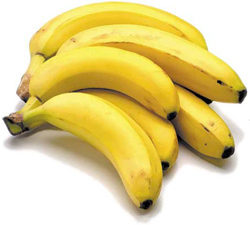yes, we have no empty backhauls

If you're enjoying a fruit salad on one of these hot summer nights, odds are at least some of the ingredients—those fresh sliced bananas or chunks of pineapple, perhaps—were brought to you by Chiquita Brands International. Chiquita, a major marketer, producer and distributor of fresh produce, supplies fruit to both North American and European markets, reaching about 60 countries overall. Last year, the company had sales of about $3.1 billion.
Each year, the company imports some 60 million boxes packed with fresh fruit into North America, reports Deverl Maserang, Chiquita's vice president, global supply chain strategy and North American logistics. The fruit—60 percent of which is bananas—is grown primarily in Panama, Costa Rica, Colombia, Guatemala and Honduras as well as Chile and Ecuador, which means getting it to markets throughout the United States and Europe in good condition is something of a challenge.
Shipments of fruit grown in Chile and Ecuador are handled by a third party, but Chiquita's own supply chain group has responsibility for shipping the fruit grown in Central America. Today, it moves most of that fruit by water via what's known as the Great White Fleet, its fleet of about a dozen refrigerated vessels, which are painted white to keep the ships and their contents cool in the tropical sun. Great White Fleet vessels bound for North America deposit fruit destined for distribution in the East at ports in Wilmington, Del.; Port Everglades, Fla.; Gulfport, Miss.; and Freeport, Texas; shipments headed for destinations west of the Rockies are routed via Port Hueneme, Calif., north of Los Angeles. The shipments are then hauled inland by truck, primarily owner/operators pulling 53-foot refrigerated containers.
Though most would consider moving vast quantities of perishables thousands of miles by land and sea to be a challenge, Chiquita, which has been doing it for over a century now, has got that down to a science. But though the company may find it easy, it's still not cheap. When it comes to transporting highly perishable produce, there's no getting around the need for expensive refrigerated equipment (never mind that Chiquita's principal product sells for less than 60 cents a pound in North America). And given the high costs associated with operating reefers, it's not hard to understand why Maserang and his team are committed to finding backhauls for as many of its vessels and containers as possible.
Follow that container!
Of course, before you can find backhauls for your containers, chassis and pin sets, you first need to know where those assets are—no easy task when you have 9,000 containers scattered throughout Europe, North America, and the tropics. That's why, two years ago, Maserang began a pilot test of visibility tools available through the On-Demand transportation management system (TMS) marketed by LeanLogistics, a Holland, Mich.-based company that offers hosted applications.
"The first goal was to gain visibility," Maserang says. Chiquita's motor carriers operate on multi-stop routings to customers' DCs. "We first wanted to take the technology and gain visibility across the network," he says. "We had good success with that." Today, he says, the LeanLogistics system is giving Chiquita a better view of where and when capacity is available.
Maserang also reports that the LeanLogistics Supply Chain Monitor system has improved Chiquita's ability to manage the containers within its own Container Fleet Management System (CFMS). For example, the system allows Chiquita to track fuel levels in the devices used to power the refrigeration units. "When a carrier picks up a container unit," says Maserang, "we know if it's full."
The system also helps Chiquita managers keep track of each asset when it's in a carrier's control, allowing the company to assess per diem charges accurately. The system even provides Chiquita with data on carrier performance. "We are able to evaluate each carrier," Maserang says. "We're able to work with each carrier on on-time performance."
Ripe for expansion
Buoyed by the success of the visibility tools pilot project, Chiquita decided to expand the application. "We said let's move forward and go over to the core of our business on the banana side and the Great White Fleet," says Maserang. "We took those two business units and in 2004 integrated LeanLogistics' TMS with our ERP [from J.D. Edwards]."
Maserang's goal was to use the system to identify operational efficiencies and improve customer service. The company began working with carriers to enter appointments and status updates, and to provide visibility into shipments to Chiquita, carriers and customers. The system has helped Chiquita and its carriers identify continuous move opportunities for its motor carriers.
That led to the next step, bringing Chiquita's freight payment and audit provider, Cass Bank, into the picture. Chiquita and LeanLogistics have begun an aggressive project to implement an integrated application linking its CFMS, LeanLogistics' Supply Chain Monitor and the Cass Bank third-party payment system.
Chiquita charges carriers a per diem rate for use of the containers for backhauls. A fixed number of days are allotted in each lane for banana delivery and return of the container to the port, and carriers are charged for additional days at that contracted per diem rate. Until now, Maserang says, accounting for the container rental period was difficult, labor-intensive and error-prone. Because Chiquita was not able to accurately capture the number of days carriers had possession of the containers, it was losing significant rental income. At the same time, Maserang reports, the company was finding managing charges and payments to carriers to be a particular headache. Per diems had to be invoiced separately from freight payments to the carriers.
Now, he's launching an application to eliminate the invoice and set up an automatic payment system that matches per diems with payments to carriers. The LeanLogistics On-Demand TMS system will assign per diem charges to the appropriate carriers at the transaction level, allowing direct deduction of the container rental charges from Chiquita's freight bill, which will then enable Cass to make a net payment to the carriers.
The idea is to operate a mutually beneficial system, says Maserang. "We're trying to provide value back to the carriers, by not sending invoices, by understanding how to evaluate the use of a container, and by matching a carrier with a backhaul.We need to grow the backhaul component.We don't fill all the containers on our own accord. We rely on the truckers to provide the backhaul. Now we're working more to grow the network."
The backhaul business connects directly to the Great White Fleet, whose managers are always on the lookout for international shipments that can provide backhauls on the vessels. Products such as paper, resin, and automobiles all represent potential backhaul business. Likewise, Chiquita's truckers are constantly on the lookout for domestic backhauls destined for the Gulfport, Miss., area. Chiquita needs empty containers there for its own shipments of rolled paper stock used to build boxes for bananas in Central America.
Getting leaner
While Chiquita has been fine-tuning its transportation management, the company has also started to evaluate use of a dedicated truck fleet in some areas. "We wanted to add capacity where it was appropriate," Maserang says. "We've started to pick lanes and recently implemented [dedicated carriage] on those lanes."
Ryder, a third-party logistics company, provides the dedicated contract carriage on those initial lanes. But it may eventually be joined by other vendors. Maserang says he is considering using multiple providers.
As for the future, Maserang says that he now wants to take advantage of the technological capabilities offered by the LeanLogistics tools to develop more in-depth applications. "We want to grow our ability to provide service at a lower cost and to provide better service to our customers," he says. "We have started to look for better ways to manage with this tool."
make it fast
At 99 Cents Only Stores, speed is crucial, especially when it comes to perishable foodstuffs. As its name suggests, the City of Commerce, Calif. based chain, which operates nearly 230 stores in California, Texas, Nevada and Arizona, specializes in selling products at a single price. Operating under what's known as the "opportunistic purchasing" business model, the chain's buyers basically scour the country for deals, scooping up merchandise or foodstuffs that someone else is anxious to sell. And when it comes to bread, deli items and produce, that generally means the products are well into their brief shelf life.
That creates some interesting challenges for the retailer's DCs in City of Commerce, Calif., and Katy, Texas, near Houston. To begin with, the centers never can be certain exactly what products will come pouring through their doors on a particular day. What they can take for granted, however, is that much of it will be perishable. Although the exact product mix varies, between 40 and 50 percent of the stores' products at any given time are foodstuffs, says Robert Adams, vice president of information systems for 99 Cents Only Stores.
Though canned goods typically move through the retailer's capacious main warehouse in City of Commerce, which measures close to a million square feet, fresh and frozen food goes through a smaller frozen and refrigerated warehouse nearby. And it moves quickly. Adams says that fresh food is shipped to stores close to the day it arrives. "We turn the stuff incredibly fast," he says. He notes that because the company buys only bagged products, not loose fruits or vegetables, "it goes in and out pretty easily." Most of the picks are full case. Very few full pallet loads leave the frozen and refrigerated warehouse.
In Katy, a small portion of the 750,000-square-foot warehouse is set aside for fresh and frozen goods, although Adams says the space can be expanded to about 250,000 square feet if necessary. And it may well be necessary: The company is in the early stages of a major expansion in Texas, with plans for no fewer than 150 stores on the drawing board.
Though you might not expect it of a chain that has made its fortune doing everything on the cheap, several of those DCs boast both high-tech warehousing systems and voice-recognition technology. When the chain acquired the Katy warehouse and began to outfit it for its planned expansion in Texas, Adams selected Supply Chain Advantage software from HighJump, a Minnesota-based supply chain software company, in large part because of its ability to integrate receiving with other functions. The warehouse management component also is integrated with the Voxware voice picking system installed in Katy. Recently, 99 Cents Only Stores added the HighJump and Voxware technology to the California food warehouse, and it's now completing the systems' implementation at the main DC.
Related Articles

Copyright ©2024. All Rights ReservedDesign, CMS, Hosting & Web Development :: ePublishing